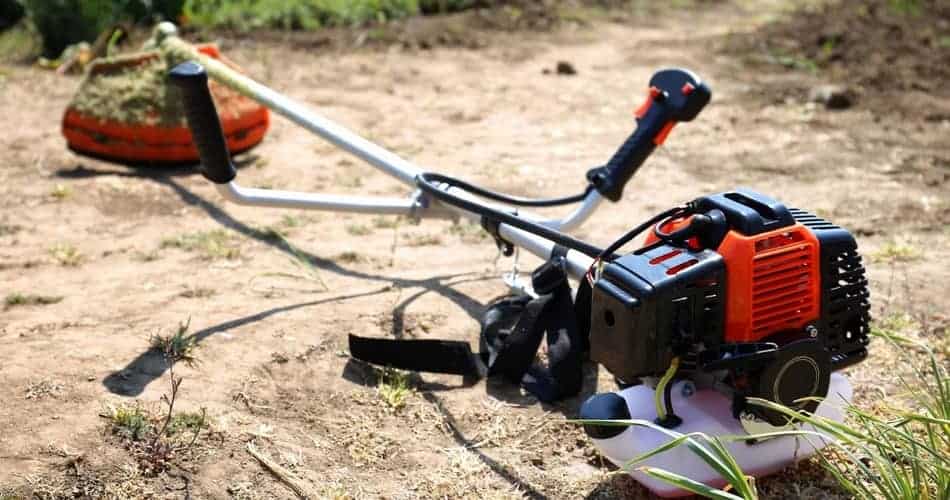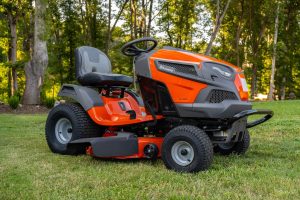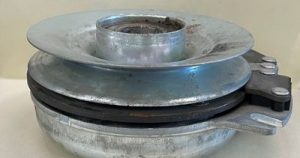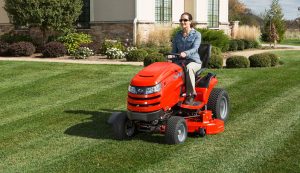Equipment to Start Your Lawn Business the Right Way
Everyone dreams about owning their own business at one time or another. You drive past a professional mowing a lawn and think to yourself, “I can do that”. Starting a lawn care business is possible, but it may take more money than you think. How much money will you actually have to spend to get started?
To start a lawn care business you will need a truck, trailer, lawn mower, push mower, hand tools, handheld power equipment, sprayers, and safety equipment. You will also need to have funds for equipment maintenance & repairs, contracts, and business insurance.
Working with lawn care companies daily, I get to see where a new start-up lawn care business made a bad decision by cutting corners on one purchase and spending way too much on another purchase that wasn’t needed.
I am trying to save you time with a complete list of equipment needed to make your dream a reality.

This post may include affiliate links. Purchases made through these links may provide a commission for us, at no extra cost to you. As an Amazon Associate, we earn from qualifying purchases.
Follow all safety instructions provided in your equipment operator’s manual prior to diagnosing, repairing, or operating.Consult a professional if you don’t have the skills, or knowledge or are not in the condition to perform the repair safely.
Table of Contents
11 Items & Equipment Needed to Start A Lawn Care Business
1. Heavy Duty Truck – $15,000 to $65,000
You are going to need a heavy-duty truck. A half-ton pickup truck is a good choice for lawn mowing, but it’s not so great for landscaping.
You will be better off with a 3/4 ton pickup truck. The price of pickup trucks can vary greatly between the big 3 automakers General Motors, Ford, and Fiat Chrysler (Dodge).
Starting out, you may want to choose to find a used vehicle which can start at $12,000 and easily cost up to $65,000 for new one. When selecting a vehicle, keep in mind the impact of downtime if your truck happens to need repairs.
Make sure the truck you select is reliable and you have a repair facility that can quickly complete any repairs needed and get you back on the job.
You will need a towing package, heavy-duty tires, air conditioning, and large side mirrors.
The only reason I mention air conditioning is that when it’s a hot day and you are in the sun, you do need to keep yourself cool in between jobs to avoid heat exhaustion or suffering from a heat stroke.
2. Utility Trailer – $2,500 to $4,500
The next thing you will need is, at minimum, a 24-foot heavy-duty trailer with a fold-down ramp gate.
The ramp needs to be at least 5 ft long in order to be able to run a zero turn up and down the gate without getting stuck at the top of the ramp or having your deck spindles hit the deck of the trailer.
Running a mower deck up and down a trailer multiple times a day and getting the mower deck caught can cause damage to your deck frame and spindles resulting adding to the cost of the maintenance to the mower.
Another option for a trailer with a ramp gate is a tilt deck trailer. I personally prefer the ramp gate. These trailers usually last longer for a lawn care business with less maintenance. It’s also nicer when loading multiple pieces of equipment.
If you currently have a trailer with a fold-down gate and your equipment hits the top of the trailer, you can have an extension welded onto the gate. Adding a lift assist mechanism will help you with the additional weight this adds to the gate.
Another option is to add boards to the end of the gate. You can always try backing your mower onto the trailer to see if that resolves your deck getting hitting the top of the trailer.
3. Zero Turn or Walk Behind Lawn Mower – $4,500 to $13,000
The size and cost of a lawn mower will depend on the type of properties you are mowing. When selecting a mower you will want to consider the most efficient deck size for your lawn mowing needs.
A larger deck size can reduce the time it takes to mow larger projects in unrestricted areas, but it will not be able to get into small areas very easily and may slow down your smaller jobs or around some areas with obstacles.
Most lawn care companies choose between a zero-turn, stand-on, or walk-behind mowers with a 52″ and 60″ deck size for their larger open lawns with acreage.
These mowers run between $6,000 to $13,000. A lawn mower with a 36″ or 48″ deck for 1/2 -1 acre yards run between $4,500 and $6,000.
If you are mowing smaller residential yards with narrow pathways, hills, and flower beds it will be good to have this size deck in your mower fleet.
Keep in mind that some of your residential yards will require you to fit through a 36″ gate to gain access to the backyard. A 30″ walk-behind mower will work best to maintain a good productivity level.
Lawn mowers have become more expensive over the years because of upgraded technology and features found on today’s lawn mowers.
Other items to consider when purchasing a lawn mower:
- Hydrostatic or Belt Driven Mower
Belt drive mowers don’t mow well if there is a lot of dew on the lawn in late summer and early fall. The dew will make the belts slip under load. This would slow down our early mowing cutting. - Engine Size
A larger engine is going to consume more fuel. Select an engine size that will power your mower and any options you choose to add. Bigger isn’t always better. - Grass Collection System
You will need a collection system for leaves in the spring and fall cleanups. Select a mower and engine size that will allow you to add a collection system. - Trailer Size
Consider trailer size when selecting your mower. Do you have enough space to accommodate a 60″ mower deck? Will you be able to fit the other lawn care equipment you may need on the trailer?
4. Commercial Self-Propelled Push Mower – $800 to $1,400
It’s good to have a push mower on hand to get into small tight areas. Push mowers work well to finish up the mowing next to a retaining wall or water feature.
You must keep 5 feet away from these when mowing with your zero-turn or walk behind mower for safety reasons.
A push mower or self-propelled mower works best for this. When using this mower several times a day, I recommend spending a little extra money on a good self-propelled mower so you don’t become fatigued with the constant push of a regular push lawn mower.
5. Handheld Equipment – $250 to $600 Each
Now let’s look at the other tools you will need. You will want to buy an edger, trimmer, and leaf blower. These items will vary in price. Just remember we need commercial products so they will last more than one season.
Trimmers, also known as weed whips, can cost anywhere from $250 to $375. Edgers come with a little larger engine than the trimmers because they are under more of a load while working so these are more money.
They run $400 to $600. Don’t forget to get extra blades for a few dollars a piece.
- Trimmers
You will need a trimmer to complete the trimmed look in areas a mower can’t reach like around garden beds, fence posts, and bushes. These are also known as weed whips. Trimmers can cost anywhere from $250 to $375. - Edgers
Nothing looks better and refined as a nicely edged driveway and sidewalk. Edgers come with a little larger engine than the trimmers because they are under more of a load while working so these are more money. They run $400 to $600. Don’t forget to get extra blades for a few dollars a piece. - Leaf Blowers
The backpack leaf blower can be the most important tool on your trailer beside the lawn mowers just because we do so much with these. A leaf blower is necessary to blow grass clippings off of the driveway and walkways.You’ll use it during fall clean-up to remove leaves from customers’ yards and to clean off your equipment daily before storage. You can spend $400 to $600 on a good leaf blower. Gas and 2-cycle oil will run you about $20 to $30.
6. Fertilizer Sprayers & Spreaders – $100 to $13,000 Each
If you’re going to be providing weed control as a service you may want to consider a sprayer or fertilizer spreader. Consider the cost of providing this service to your customer.
Check with your State as you may have to get an applicator’s license to be able to purchase commercial products to provide fertilizer and weed control.
When just starting out with your lawn care business it may be best to focus on getting customers and subcontracting weed control and fertilizing until you are able to get more established in your business before adding the additional expense.
There are several different types of sprayers and spreaders:
- A Manual Sprayer with Hand Pump – Starting at $100
This sprayer is the most inexpensive method. You can use this sprayer for liquid fertilizers, weed killers and pesticides. This is best for smaller area applications. For larger fertilizer applications you will want to use a broadcast spreader or stand-on sprayer. - Broadcast Spreader – Starting at $175
For granular fertilizer, I like the Chapin International 8400C. This is a quality unit at a great price for those that aren’t fertilizing large lawns or a lot of lawns. This spreader will hold up to 100 lb of fertilizer. It runs about $320. - Stand-on Spreader Sprayers – Starting at $7,000
For the serious fertilizer professional with multiple contracts and large lawns, a stand-on motorized sprayer may be best. They run $7000 to $13,000 depending on the size and setup of the unit. Z-Spray is a top-of-the-line sprayer. PermaGreen and Ferris also offer stand-on sprayers.
7. Hand Tools, Accessories & Spare Parts
Plan to purchase shovels, rakes, pruning shears, repair tools, wheelbarrow, gas cans, and debris disposal bags.
It is good practice to keep routine wear items on hand for your equipment so you’re not suffering from equipment being down for too long. Items you will want to keep on hand are engine and hydraulic oil and filters, belts, blades, and two-cycle oil.
8. Safety Equipment
Remember to keep yourself and your employees safe on the job. You need to have gloves, eye protection, and hearing protection. It’s a good idea to have safety vests or bright-colored shirts when working in high-traffic areas.
I know a couple of people who have gotten hit by a car because the driver wasn’t paying attention. A bright vest will catch the driver’s attention.
Have safety traffic cones to place by the trailer when you have to be parked by the side of the road. You will also want to make sure you and your staff have been properly trained on workplace safety.
Occupational Safety and Health Administration (OSHA) reports over a dozen fatalities a year of grounds care and lawncare employees.
9. Maintenance & Repair Budget
You need to be prepared when your equipment breaks and have a budget to perform these repairs along with regular maintenance on your equipment. No one likes spending money to fix equipment.
If you set aside a budget to keep your equipment well maintained, you will save money in the long run by not having to perform expensive major repairs as a result of neglect.
Factor in the daily costs of oil and gas consumption in your equipment. This includes a two-cycle gas/oil mixture for your handheld equipment and fuel for your lawn mower and vehicles.
10. Lawn Care Service Contract
It’s an important part of the business to have a lawn service contract that outlines the tasks that will be performed, how often they will be performed, and the duration of the contract.
You may choose to draw up a seasonal contract for a set amount for the duration of the season or charge a specific amount for each time the yard is mowed.
Include any additional services or charges that you will charge in addition to mowing such as leaf clean up, weeding flower beds, fertilizing, and weed management.
Make your contract as clear as possible so there are no false expectations by either party. Consult with an attorney to ensure your contract will be upheld in a court of law.
11. Insurance
You will need to make sure you have the necessary insurance coverage to protect yourself, your equipment, and your business. You will need vehicle and property insurance to cover your equipment.
I also recommend you consult with your local commercial insurance agent to verify you are fully covered for any property damages and injuries.
When adding employees, you may also want to look into health insurance and other employee benefits.
How to Start a Lawn Care Business with No Money
While a lawn care business takes quite a bit of money to start and run there are ways where you can start a business without a large outlay of cash. It’s best to focus on starting small and growing as your income allows.
A lawn care business can be started with little money by utilizing manufacturer finance programs, limiting the lawn care services provided, utilizing income from clients under contract, and borrowing common hand tools from family members and friends to get started while you save money to build your own inventory of equipment and tools.
1. Utilize Manufacturer Finance Programs
Many manufacturers offer competitive finance rates at a 0% or low-interest rate to further promote their product lines.
If you don’t have good credit or established credit history, you can finance with the help of a co-signer or look into leasing options with companies that are willing to work with clients who have less than good credit history.
2. Limit Lawn Care Services Provided
When getting started, and you are unable to purchase multiple mowers, you may want to find customers with similar size yards where one size mower will work along with a handheld trimmer to finish the trim work around landscape features and fencing.
For example, you will want a large deck for large acreage properties and a smaller format mower for city or suburban lots that fit through gates.
You may not want to offer fertilizing and weed control to customers. This often requires classes and licensing to work with fertilizers.
Instead of having to come up with funds for fertilizers, spreaders, and sprayers, you can work with a local company that already provides this service to work with your customers.
3. Set Up Clients with Seasonal Contracts for Initial Income
Having a group of clients on a seasonal contract will allow you to have a planned income for your business. You can choose to set your customers up on a payment plan.
If you need income at the beginning of the season to purchase tools, you may want to offer a small discount for prepaying for the season.
Be aware you will need funds during the season for repairs, maintenance, and any monthly equipment payments you may have. Don’t allow yourself to get in a position where you are short on cash at the end of the season.
4. Borrow Tools Until You Can Purchase Your Own
You may have a friend or family member who has a garage full of tools and handheld power equipment. He or she may be happy to help you out short term and allow you to borrow tools while you are getting started.
This can be a good option when you decide what is most important to purchase initially for your business once you have more income. Remember to not take advantage of this friend and purchase your own equipment as soon as you are able to.
Related Items
A good entry-level mower to start with until you are able to afford an upgraded commercial mower is the Exmark Radius S- Series or Husqvarna Z460. I have put together a comparison of the Exmark and Husqvarna to help you with your next purchasing decision.







